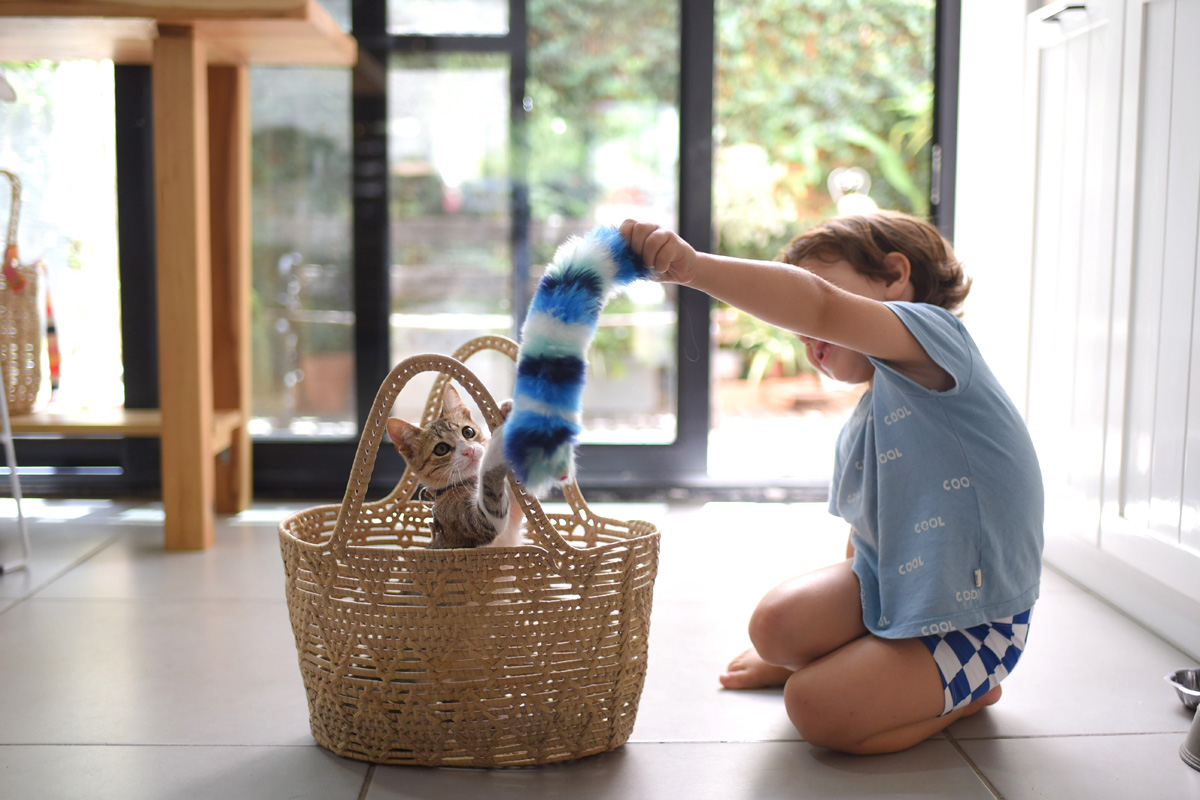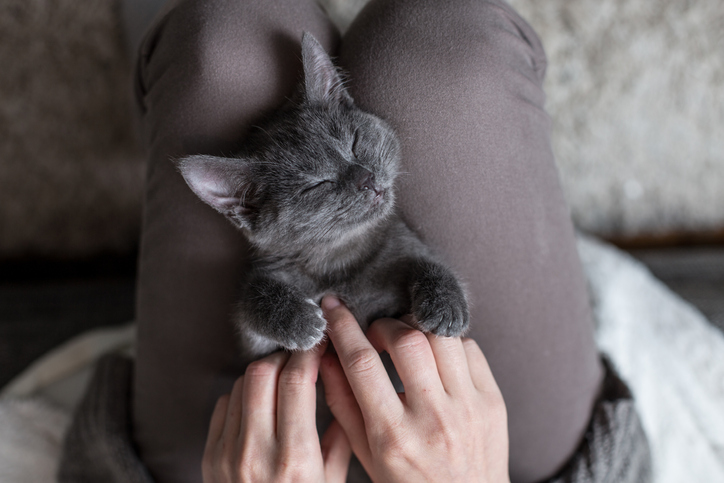What to know
- Cats can sometimes carry harmful germs that can make people sick.
- Wash your hands after handling, cleaning up after, or feeding cats.
- Provide your cat with routine veterinary care to keep it healthy and prevent the spread of diseases.

Overview
Nearly 40 million households in the United States have pet cats. Research has shown that cats can provide emotional support, improve moods, and contribute to the overall morale of their owners. Cats are also credited with promoting socialization among older people and physically or mentally disabled people.
Although cats are great companions, cat owners should be aware that sometimes cats can carry harmful germs that can make people sick. This can happen even when they appear healthy and clean.
How to stay healthy around cats

Wash your hands
Wash your hands with soap and running water:
- After handling cats, their food and water dishes, or their supplies
- After contact with cat saliva or poop
- After cleaning a litter box
- After gardening, especially if outdoor cats live in the area
- Before you eat or drink
Adults should supervise hand washing for children under 5 years old. Use hand sanitizer if soap and water are not readily available. Wear gloves while gardening, particularly if you know that outdoor cats live in the area.
Safely clean up after your cat
Cats can carry many germs in their poop. To stay healthy, take precautions when cleaning a cat's litter box. Change litter boxes daily. Always wash your hands after cleaning the litter box, even if you use a scoop to remove the poop.
People at high risk for complications
People with weakened immune systems and pregnant women should not clean litter boxes, if possible. They are more at risk for complications from germs spread by cats. If no one else can perform the task, wear disposable gloves and wash your hands afterwards.
Keep your cat's litter box away from other animals, children, and food preparation areas.
Prevent cat scratches and bites

Cat bites and scratches can spread germs, even if the wound does not seem deep or serious. For example, cat scratch disease can happen if a scratch only breaks the surface of the skin.
We don’t know exactly how many people are bitten or scratched by cats each year because incidents often aren’t reported. However, we do know that about 20-80% of reported cat bites and scratches become infected.
Use caution around unfamiliar cats
Be cautious with unfamiliar animals.
Avoid rough play
Avoid rough play with cats and kittens. Rough play causes cats to be defensive toward people. Avoid rough play when animals are young. This will lead to fewer scratches and bites as animals become older.
Regularly trim your cat's nails
Studies have shown cats generally bite when provoked. Trim your cat's nails regularly. If you need help, ask your veterinarian.
Educate children
Teach children to inform their parents or an adult if they are ever bitten or scratched by any animal, including cats.
What to do if you are bitten or scratched by a cat
If you are bitten or scratched by a cat, you should:
Wash wounds with warm soapy water immediately. Seek medical attention if:
- You don't know if the cat has been vaccinated against rabies.
- The cat appears sick.
- The wound is serious.
- The wound becomes red, painful, warm or swollen.
- It has been more than 5 years since your last tetanus shot.
Report the bite to animal control or your local health department if the bite is unprovoked and
- The cat is a stray, or
- You are unsure if the cat has been vaccinated against rabies.
Cat bites carry the risk of spreading rabies to humans. Ensure the cat is seen by a veterinarian if it becomes sick or dies shortly after the bite. Report the bite by contacting your local health department.
How to keep pet cats healthy

Before choosing a cat
Certain types of cat or kitten adoptions may not be suitable for your family because of the risk for disease. This includes international pet adoptions. Use caution if young children, pregnant women, or people with weakened immune systems live in the household.
Research and learn how to properly care for your cat or kitten before you purchase or adopt. Ask your veterinarian or pet store staff how to properly care for the cat or kitten you are selecting. This includes asking about the best food and enclosure or environment for your potential pet.
Be aware that cats may shed Toxoplasma, Giardia, hookworms, roundworms and other germs in their poop. Plan to change the litterbox daily and always wash your hands after.
How to choose a cat
Match a cat's personality and activity levels with:
- Your family,
- The animals you already have in your household, and
- The amount of time you have to spend with your pet.
Pick a cat that is bright, alert, and playful. Cats and kittens should have shiny, soft fur that is free of poop and debris.
Take your new cat or kitten to the veterinarian within a few days to a week after adoption.
If you adopt a sick cat
Signs of sickness in a cat include:
- Appearing sluggish or depressed
- Having diarrhea
- Abnormal breathing
- Fluid running from its eyes or nose
If your cat becomes sick or dies soon after purchase or adoption, take it to the veterinarian promptly. Inform the pet store, breeder, or rescue organization about the pet's illness or death. Make sure to tell your veterinarian if the pet was adopted from a shelter or from international pet adoption.
How to house your cat
Provide a safe, warm, and comfortable environment for your cat to live in. Talk to your veterinarian about creating a safe environment for your cat.
If you allow your cat outside, provide shelter when it is cold or rainy and shade when it is hot. Your cat should have access to the indoors at night to stay safe from predators.
Make sure your cat has access to food and fresh water every day. Be aware that leaving food outdoors for your cat may attract unwanted wildlife. This wildlife can spread diseases to your cat.
Each cat in a household should have its own litterbox plus one additional box.
Monitor your cat’s health

Take your cat to the veterinarian regularly to keep it healthy and prevent infectious diseases. Talk to your veterinarian about preventive treatments for fleas, heartworms, ticks, and other parasites.
Contact your veterinarian if you notice any signs of illness in your pet. Keep in mind that even cats that look healthy can spread germs to people and other animals.
Make sure to clean up any urine, poop, or vomit in the house immediately, and disinfect the area after cleaning. Make sure to wash your hands thoroughly afterwards.
Get your cat vaccinated
Vaccinations can help protect your cat from dangerous diseases and help them live a longer, healthier life. Keep your cat up-to-date on routine vaccinations like rabies and feline distemper vaccine.
Ask your veterinarian about other vaccines you may need or want for your cat, like feline leukemia.
Keep your veterinarian informed
Tell your veterinarian about your cat's lifestyle. This includes whether your cat is indoor, outdoor, or both. Tell your veterinarian if there are other animals at home or that the cat may come into contact with.
Protect your cat from ticks
Talk to your veterinarian about the best tick prevention products for your cat and tickborne diseases in your area.
Cats are extremely sensitive to a variety of chemicals. Do not apply any tick prevention products to your cat without first asking your veterinarian.
Resources
Selecting and caring for a pet cat
- Selecting a cat (American Veterinary Medical Association)
- Traveling with your cat (US Department of Agriculture)
- Administration of Rabies Vaccination State Laws (American Veterinary Medical Association)
Educational materials
- Pet Food Safety (Poster)
- Raw Pet Food Safety (Poster)
- Pet Disaster Kit Checklist
- Check Pets for Ticks (Infographic)
- Cleaning and Disinfecting Pet Supplies (Poster)
- Stay Healthy Around Animals (Coloring Book)
